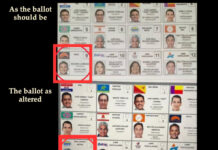
Roux wins the CD delegate elections, seems set to take the party back to its old status
by Eric Jackson
A major political party would not only be a contender for national political power. It would be expected to survive the physical or political demise of its top leader. It would stand for something in most people’s eyes, whether or not they agree with that something. It would be something that its members would rather not destroy.
In some countries, minor parties stand for a belief system, a segment of society or some sort of subculture. Not so in Panama. Here the small parties are businesses. They are bets that whatever major party comes out on top in a national election, it will be short of the support it needs for a working majority in the legislature and thus amenable to deals with small formations, wherein support on key matters is exchanged for government jobs or contracts. Until 2009, that’s what Ricardo Martinelli’s Cambio Democratico party was.
Then the nation’s largest party, the Democratic Revolutionary Party (PRD), at the end of a 2005-2009 Martín Torrijos administration in which it gutted the public pension system, passed out poisonous cough syrup that killed hundreds and then tried to cover it up instead of helping the surviving victims, then fell out among themselves in a brawl of broken deals and angry recriminations from which an unreconstructed Norieguista, Balbina Herrera, emerged as the nominee. The image wasn’t softened by Balbina’s promises to shut down news websites that she did not control. So, from the grubby business of the small party world, supermarket tycoon Ricardo Martinelli emerged to win the presidency by a landslide. His party didn’t come close to winning the National Assembly, but through bribery and blackmail he managed to engineer enough defections from the other parties to cobble together a legislative majority.
The looting binge, the manipulation of the legal system, the violence, the massive bribery and graft, the surveillance and appropriation of government databases for partisan uses, the tawdry moves to make himself president by proxy for another term — it all came dangerously close but Martinelli fell short in 2014. We now live in the aftermath. On paper, CD still has some 342,000 members.
The first thing that Martinelli did after losing the elections was to steal the surveillance equipment and databases acquired at public expense. The next thing he did was to threaten the legislators elected on the party ticket for the 2014-2019 term with the files he said he had on every one of them. In the first year of the next administration President Juan Carlos Varela’s Panameñista Party and the PRD, neither close to a majority in the legislature on its own, formed an alliance to keep the CD out. A year later, half of the CD deputies defied Martinelli, who by then had fled the country. Since then, amidst all the fault lines, the party has been above all divided between those who automatically follow Martinelli’s orders from Miami and those who disobey such commands. This past July, 16 of 25 CD deputies aligned with the Panameñistas and a few dissidents from the PRD to make a CD dissident, Yanibel Ábrego, the legislature’s presiding deputy. A Martinelli loyalist crowd, prone to squabbling among themselves and principally led by Martinelli’s appointee as acting party president Alma Cortés and Martinelli spokesman Eduardo Camacho, has retained control of the party apparatus and moved to expel the 16 dissident legislators from the party.
However, Cortés, Camacho and most of the other prominent loyalists are in and out of court and jail on a variety of charges. Against them for the party leadership is the CD secretary general, Rómulo Roux. A former cabinet member, he served as canal affairs minister, then briefly as minister of the presidency, before stepping down for an unsuccessful bid for the 2014 CD presidential nomination. If one discounts the cabinet when Martinelli and Varela were allies for the first 26 months of the last government, of those who came later Roux is the only minister who is not in serious legal trouble. Could it be that he’s a wily attorney from the country’s most prestigious law firm, Morgan & Morgan? Was it scruples? Was it luck? In any case, the suspense in Roux’s life has not been about whether he will get out on bail. With others calling him a traitor, he has been quietly making the rounds of party organizations and elected officials and is on pretty good terms with most of the legislators who have defied Martinelli.
On October 15 CD members went to the polls to elect delegates to local, provincial and national conventions that will culminate in the election of new national party leaders and arrangements for a primary to select the 2019 presidential nominee.
Roux put together the Renovacion CD slate, which stands for nothing in particular. By all accounts they won most of the delegates. Also at stake in the October 15 voting were the leaderships of the party’s women’s and youth organizations, and the Renovacion CD candidates for these, Ana Giselle Rosas de Vallarino and Maidir Miller respectively, won their races. Roux wants the presidential nomination and so do a bunch of others, but at this point the 2019 party standard appears to be his to lose. Martinelli’s gang may seek to change those equations by throwing those who just beat them out of the party, but it’s unlikely that the Electoral Tribunal would allow them to do this.
So what has Roux won? The Electoral Tribunal says that about 20 percent of the party’s membership took part in the internal elections. That’s a little under 70,000 people. That’s not nearly enough to win a national election, but sufficient to maintain ballot status and get one of more people elected to the National Assembly. But that was just one of the primaries, one might argue, and the turnout will be substantially higher in subsequent voting, especially in the general election. Will it? Already there are splinter parties forming and CD deputies expressing their intention to join them. A string of court victories and prosecutorial dives that gets all charges against Ricardo Martinelli and his gang off of all major charges would be a distinct possibility, and that may shore up the CD share of the fools’ vote, but that sort of exercise in corruption would likely cost the party many more votes than it would win.
Rómulo Roux has about 55,000 followers on his Facebook page — not all of whom like him — and he seems to have mustered something less to that at the polls on the 15th. Yes, he’s telegenic and will have some money behind him, but it’s very likely that most of the members on the CD rolls are just that on paper. Come 2019 the party’s vote total may well be in the five digits. And that would leave CD where it has usually been, as a family business small party.
Look at Roux’s people who won.
Ana Giselle Rosas de Vallarino is married into the political Vallarino clan, the daughter-in-law of former VP Arturo Vallarino and also related by marriage to legislator Marilyn Vallarino de Sellhorn and disgraced former Panama City mayor Bosco Vallarino. In the Martinelli administration she had a job with the government agency that oversees cooperatives, IPACOOP, and ran for legislator in 2014. At first she was declared the winner over Panameñista incumbent Jorge Alberto Rosas, but that result was challenged because government funds were used to buy votes for her. The alleged extent of it was much greater, but the Electoral Tribunal overturned the result on the basis of 99 checks, in the aggregate amount of $104,500, stolen from the IFARHU scholarship fund and used to buy votes. On the rerun Ana Giselle lost.
Maidir Miller is the son of legislator and CD vice president Mario Miller. The elder Miller has the distinction of being the only post-invasion legislator kicked out of both his party and his seat in the National Assembly by his colleagues. He was a PRD deputy from Bocas and early in the Pérez Balladares administration he was arrested for an alleged extortion attempt against some business owners. He did take the briefcase with the marked bills, but said that it was represented as something else to him. Eventually he was acquitted, but only got back to the legislature by getting elected on Mr. Martinelli’s ticket.
A family business for the political caste, in reduced circumstances not about national power but about sinecures and sales to the government. That seems to be the direction that CD is headed. If the circumstances are all that reduced there are not going to be all that many hack jobs and contracts to go around. Thus the ferocious if unequal infighting. Roux just had the unique in that party advantage of unindicted status.
Correction: In the original caption we had Roux on the right in the photo, when of course it’s him on the left.
~ ~ ~
These announcements are interactive. Click on them for more information.










